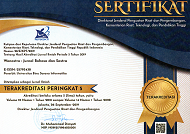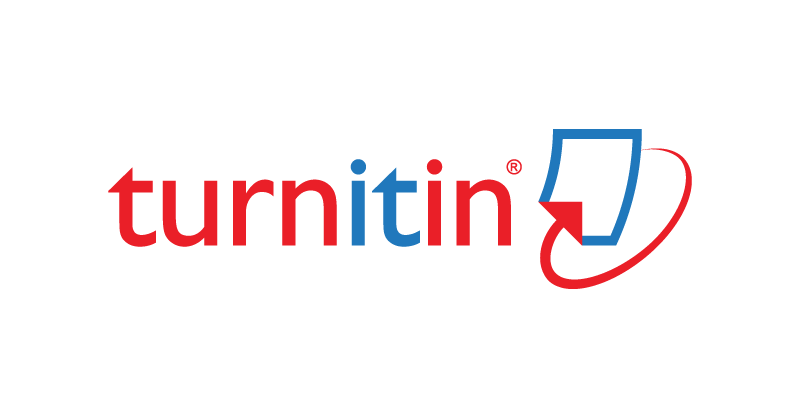Exploring Acehnese EFL College Students’ Perceptions on Collaborative Writing
Abstract
Full Text:
PDFReferences
Aminloo, M. S. (2013). The Effect of Collaborative Writing on EFL Learners Writing Ability at Elementary Level. Journal of Language Teaching and Research, 4(4), 164-175. doi: 10.4304/jltr.4.4.801-806
Ajideh, P., Leitner, G., & Yazdi, A., Seyed, Y. (2016). The influence of collaboration on individual writing quality: the case of Iranian vs. Malaysian college students. Journal of English Language Teaching and Learning, 17, 1-24. Retrieved from https://www.researchgate.net/publication/311343894_The_Influence_of_Collaboration_on_Individual_Writing_Quality_The_Case_of_Iranian_vs_Malaysian_College_Students
Arnold, N., Ducate, L., & Kost, C. (2012). Collaboration or cooperation? analyzing group dynamics and revision processes in wikis. CALICO Journal, 29(3), 431–448. doi: 10.11139/cj.29.3.431-448
Barbier, M. L., & Ransdell, S. E. (2012). New directions for research in L2 writing. Dordrecht, South Holland: Kluwer Academic Publishers.
Biria, R., & Jafari, S. (2013). The impact of collaborative writing on the writing fluency of Iranian EFL learners. Journal of Language Teaching and Research, 4(1), 164–175. doi: 10.4304/jltr.4.1.164-175
Brodahl, C., & Hansen, N. K. (2014). Education students’ use of collaborative writing tools in collectively reflective essay papers. Journal of Information Technology Education: Research, 13, 91–120. doi: 10.28945/1960
Caruso, G. (2000). The Impact of Wiki-based Collaborative Writing on English L2 Learners Individual Writing Development (Doctoral dissertation). Retrieved from https://www.researchgate.net/publication/271646433_The_Impact_of_Wiki-based_Collaborative_Writing_on_English_L2_Learners'_Individual_Writing_Development
Chesters, S. D. (2012). The Socratic classroom: reflective thinking through collaborative inquiry. Rotterdam, South Holland: Sense Publishers.
Dar, M. F., & Khan, I. (2015). Writing anxiety among public and private sectors Pakistani undergraduate university students. Pakistan Journal of Gender Studies, 10 (1), 121–136.
Deveci, T. (2018). Student perceptions on collaborative writing in a project-based course. Universal Journal of Educational Research, 6(4), 721–732. doi: 10.13189/ujer.2018.060415
Felipeto, S. C. S. (2019). Collaborative and individual writing in a classroom: an analysis of texts written by elementary school students. Alfa: Revista de Lingüística, 63(1), 141+. Doi: http://dx.doi.org/10.1590/1981-5794-1904-6
Ghufron, M. A., & Ermawati, S. (2018). The strengths and weaknesses of cooperative learning and problem-based learning in EFL writing class: teachers and students’ perspectives. International Journal of Instruction, 11(4), 657–672. doi: 10.12973/iji.2018.11441a
Haider, G. (2012). An insight into difficulties faced by Pakistani student writers: implications for teaching of writing. Journal of Educational and Social Research, 2(3),17–27.
Hewett, B. L. (2010). Virtual collaborative writing in the workplace: computer-mediated communication technologies and processes. Hershey: Information Science Reference.
Ibrahim, N., Shak, M. S. Y., Mohd, T., Ismail, N. A., Perumal, P. D. A., Zaidi, A., & Yasin, S. M. A. (2015). The importance of implementing collaborative learning in the English as a second language (ESL) classroom in Malaysia. Procedia Economics and Finance, 31(2015), 346–353. doi: 10.1016/s2212-5671(15)01208-3
Javadi-Safa, A. (2018). A brief overview of key issues in second language writing teaching and research. International Journal of Education and Literacy Studies, 6(2), 12-25. doi: http://dx.doi.org/10.7575/aiac.ijels.v.6n.2p.15
Joyce, W. B. (2010). On the Free-Rider Problem in Cooperative Learning. Journal of Education for Business, 74(5), 271–274. doi: 10.1080/08832329909601696
Kolin, P. C. (2017). Successful writing at work. Boston, Massachusetts: Cengage Learning.
Le, H., Janssen, J., & Wubbels, T. (2017). Collaborative learning practices: teacher and student perceived obstacles to effective student collaboration. Cambridge Journal of Education, 48(1), 103–122. doi: 10.1080/0305764x.2016.1259389
Lee, D., Huh, Y., & Reigeluth, C. M. (2015). Collaboration, intragroup conflict, and social skills in project-based learning. Instructional Science, 43(5), 561–590. doi: 10.1007/s11251-015-9348-7
Li, S., & Swanson, P. (2014). Engaging language learners through technology integration: theory, applications, and outcomes. Hershey, Pennsylvania: Information Science Reference.
Lin, O. P., & Maarof, N. (2013). Collaborative writing in summary writing: student perceptions and problems. Procedia – Social and Behavioral Sciences, 90, 599–606. doi: 10.1016/j.sbspro.2013.07.131
Mei, Y. (2010). Collaborative writing features. RELC Journal, 41(1), 18–30. https://doi.org/10.1177/0033688210362610
Meihami, H., Meihami, B., & Varmaghani, Z. (2013). The effect of collaborative writing on EFL students’ grammatical accuracy. International Letters of Social and Humanistic Sciences, 11, 47–56. doi: 10.18052/www.scipress.com/ilshs.11.47
Nykopp, M., Marttunen, M., & Erkens, G. (2018). Coordinating collaborative writing in an online environment. Journal of Computing in Higher Education, 31(3), 536–556. doi: 10.1007/s12528-018-9203-3
Olivera, L. C. de, & Smith, B. E. (2019). Expanding literacy practices across multiple modes and languages for. Charlotte, North Carolina: Information Age Publishing, Inc.
Osman, G., Duffy, T. M., Chang, J.-Y., & Lee, J. (2011). Learning through collaboration: student perspectives. Asia Pacific Education Review, 12(4), 547–558. doi: 10.1007/s12564-011-9156-y
Shehadeh, A. (2011). Effects and student perception of collaborative writing in L2. Journal of Second Language Writing, 20(4): 286-305. doi: 10.1016/j.jslw.2011.05.010
Sousa, L. P. D. Q., Tiraboschi, F. F., Lago, N. A. D., & Figueiredo, F. J. Q. D. (2019). Collaborative english language learning: some reflections from interactions between pairs. Trabalhos Em Linguística Aplicada, 58(1), 259–286. doi: 10.1590/010318138653439430941
Storch, N. (2011). Collaborative writing in L2 contexts: Processes, outcomes, and future directions. Annual Review of Applied Linguistics, 31, 275-288. doi: 31. 275 - 288. doi: 10.1017/S0267190511000079
Storch, N. (2013). Collaborative Writing in L2 classrooms. Clevedon, New York: Channel View Publications.
Such, B. (2019). Scaffolding English language learners for online collaborative writing activities. Interactive Learning Environments, 1–9. doi: 10.1080/10494820.2019.1579233
Supiani, S. (2017). Teaching writing skill through collaborative writing technique: from theory to practice. Journal of English Education and Linguistics Studies, 4(1), 37–52. doi: 10.30762/jeels.v4i1.330
Swain, M. (2010). Talking-it-through: Languaging as a source of learning. In R. Batstone (Ed.), Sociocognitive perspectives on language use and language learning. Oxford, UK: Oxford University Press. 112–130.
Taylor, L., & Wigglesworth, G. (2009). Are two heads better than one? Pair work in L2 assessment contexts. Language Testing, 26(3), 325–339. doi: 10.1177/0265532209104665
Villarreal, I., & Gil-Sarratea, N. (2019). The effect of collaborative writing in an EFL secondary setting. Language Teaching Research. doi: 10.1177/1362168819829017
Wismath, S. L., & Orr, D. (2015). Collaborative learning in problem solving: a case study in metacognitive learning. The Canadian Journal for the Scholarship of Teaching and Learning, 6(3) 1-19. doi: 10.5206/cjsotl-rcacea.2015.3.10
Yavuz, O., & Arslan, A. (2018). Cooperative Learning in Acquisition of the English Language Skills. European Journal of Educational Research, 7(3), 591-600. doi: 10.12973/eu-jer.7.3.591
Young, N. D., Noonan, B. T., & Bonanno-Sotiropoulos, K. (2018). Wrestling with writing: instructional strategies for struggling students. Lanham: Rowman & Littlefield.
Zeki, N. T., & Kuter, S. (2017). Impact of collaborative and reflective writing activities on students’ autonomy in writing. Quality & Quantity, 52(S1), 343–360. doi: 10.1007/s11135-017-0615-3
Zhang, M. (2018). Collaborative writing in the EFL classroom: the effects of L1 and L2 use. System, 76, 1–12. doi: 10.1016/j.system.2018.04.009
Zhang, M. (2019). Understanding L1 and L2 interaction in collaborative writing: a lexico-grammatical analysis. Language Teaching Research. doi: 10.1177/1362168819859911
Zhou, X., Chen, L. H., & Chen, C. L. (2019). Collaborative learning by teaching: a pedagogy between learner-centered and learner-driven. Sustainability, 11(4), 1174. doi: 10.3390/su11041174
DOI: https://doi.org/10.31294/w.v12i2.8579
Copyright (c) 2020 Zulfikar Zulfikar, Cut Tarri Aulia

This work is licensed under a Creative Commons Attribution-ShareAlike 4.0 International License.
Index by:
Published by Department of Research and Community Service (LPPM) Universitas Bina Sarana Informatika by supported Relawan Jurnal Indonesia
Jl. Kramat Raya No.98, Kwitang, Kec. Senen, Jakarta Pusat, DKI Jakarta 10450

This work is licensed under a Creative Commons Attribution-ShareAlike 4.0 International License






